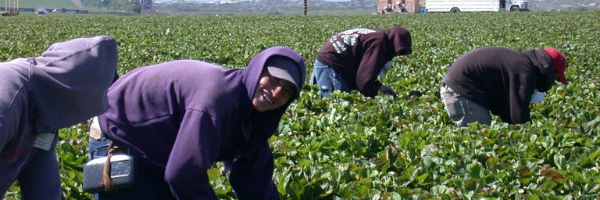14
Apr
Take Action: Our Food Supply Depends on Protecting Farmworkers
 (Beyond Pesticides, April 14, 2020) An op-ed in the New York Times asks, “What Happens if America’s 2.5 Million Farmworkers Get Sick?” Without those farmworkers, the year-round supply of fresh fruits and vegetables that we take for granted would be impossible. The supply chain of those vital foods starts with the workers who plant, cultivate, and harvest them. Our society and everyone living in the U.S. depend on farmworkers.
(Beyond Pesticides, April 14, 2020) An op-ed in the New York Times asks, “What Happens if America’s 2.5 Million Farmworkers Get Sick?” Without those farmworkers, the year-round supply of fresh fruits and vegetables that we take for granted would be impossible. The supply chain of those vital foods starts with the workers who plant, cultivate, and harvest them. Our society and everyone living in the U.S. depend on farmworkers.
Tell Congress to provide essential benefits to essential farmworkers.
But farmworkers are at high risk from the coronavirus (COVID-19) pandemic. Living in crowded conditions, social distancing is impossible for them. They have little access to health care. Washing hands is often impossible in the field. With children home from school, they have additional childcare costs to pay with their low wages. They also have increased costs from using private transportation to avoid crowded buses.
And many farmworkers are exposed to respiratory hazards like pesticides and fungal spores that make them more susceptible to the coronavirus.
As the medical demand for personal protective equipment (PPE) increases, farmworkers are being faced with potential shortages of masks, gloves, and suits. Last month, a group of Washington farmworkers walked off a worksite because their employer was not offering sufficient PPE. No farmworker should be forced to apply pesticides without the necessary PPE. EPA and states must enforce this label requirement. On March 26, EPA issued a sweeping suspension of its enforcement program, putting farmworkers at even higher risk. U.S. agricultural producers are subject to an EPA worker protection rule governing enforcement of pesticide use restrictions, rather than labor laws under the Department of Labor.
At least 50% of farmworkers are undocumented, so they will not get the relief payment most other households will, even though they are U.S. taxpayers. Even their U.S. citizen children are left out. Farmworkers need our support because they do not have the personal protective equipment (PPE) and social safety nets that they need!
Tell Congress to provide essential benefits to essential farmworkers.
Sustainable agriculture includes support for agricultural workers. Farmworkers who are currently employed on a farm should receive the same payments as any other workers without questions about their status as citizens. They should be eligible for paid sick leave, SNAP (food stamps), health coverage, and workmen’s compensation.
You can contribute directly to farm and food workers through these organizations:
- Farm Labor Organizing Committee (AFL-CIO), Midwest and North Carolina, through CMMJ
- Farmworker COVID-19 Pandemic Relief Fund
- Farmworker Association of Florida
- National Day Laborer Organizing Network (NDLON) Immigrant Worker Safety Net Fund
- Indigenous Environmental Network
- Restaurant Opportunities Centers United (ROC) Relief
- Restaurant Workers Community Foundation
- One Fair Wage Emergency Fund
Tell Congress to provide essential benefits to essential farmworkers.
Letter to Congress
An op-ed in the New York Times asks, “What Happens if America’s 2.5 Million Farmworkers Get Sick?” Without those farmworkers, the year-round supply of fresh fruits and vegetables that we take for granted would be impossible. The supply chain of those vital foods starts with the workers who plant, cultivate, and harvest them. Our society and everyone living in the U.S. depend on farmworkers.
But farmworkers are at high risk from the coronavirus (Covid-19) pandemic. Living in crowded conditions, social distancing is impossible for them. They have little access to health care. Washing hands is often impossible in the field. With children home from school, they have additional childcare costs to pay with their low wages. They also have increased costs from using private transportation to avoid crowded buses.
And many farmworkers are exposed to respiratory hazards like pesticides and fungal spores that make them more susceptible to the coronavirus. On March 26, EPA issued a sweeping suspension of its enforcement program, putting farmworkers at even higher risk. U.S. agricultural producers are subject to an EPA worker protection rule governing enforcement of pesticide use restrictions, rather than labor laws under the Department of Labor.
As the medical demand for personal protective equipment (PPE) increases, farmworkers are being faced with potential shortages of masks, gloves, and suits. Last month, a group of Washington farmworkers walked off a worksite because their employer was not offering sufficient PPE.
At least 50% of farmworkers are undocumented, so they will not get the relief payment most other households will, even though they are U.S. taxpayers. Even their U.S. citizen children are left out.
If we want a continued supply of vital foods, we must support agricultural workers. Please take the following actions:
*Farmworkers who are currently employed on a farm should receive the same payments as any other workers without questions about their status as citizens.
*Farmworkers, regardless of immigration status, must be eligible for paid sick leave, SNAP (food stamps), health coverage, and workers’ compensation.
*Hazard pay must be provided immediately for these workers who are now working in a dangerous environment and dealing with large additional expenses.
*EPA and states must enforce pesticide product label requirements and the EPA farmworker protection rule so that no farmworker is be forced to apply pesticides without the necessary PPE.
Thank you.










